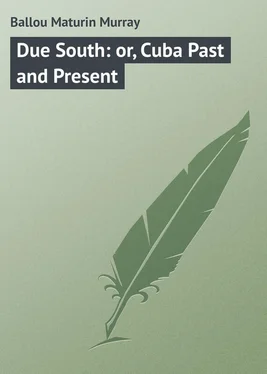Maturin Ballou - Due South - or, Cuba Past and Present
Здесь есть возможность читать онлайн «Maturin Ballou - Due South - or, Cuba Past and Present» — ознакомительный отрывок электронной книги совершенно бесплатно, а после прочтения отрывка купить полную версию. В некоторых случаях можно слушать аудио, скачать через торрент в формате fb2 и присутствует краткое содержание. ISBN: , Жанр: foreign_prose, на английском языке. Описание произведения, (предисловие) а так же отзывы посетителей доступны на портале библиотеки ЛибКат.
- Название:Due South: or, Cuba Past and Present
- Автор:
- Жанр:
- Год:неизвестен
- ISBN:http://www.gutenberg.org/ebooks/30130
- Рейтинг книги:4 / 5. Голосов: 1
-
Избранное:Добавить в избранное
- Отзывы:
-
Ваша оценка:
- 80
- 1
- 2
- 3
- 4
- 5
Due South: or, Cuba Past and Present: краткое содержание, описание и аннотация
Предлагаем к чтению аннотацию, описание, краткое содержание или предисловие (зависит от того, что написал сам автор книги «Due South: or, Cuba Past and Present»). Если вы не нашли необходимую информацию о книге — напишите в комментариях, мы постараемся отыскать её.
Due South: or, Cuba Past and Present — читать онлайн ознакомительный отрывок
Ниже представлен текст книги, разбитый по страницам. Система сохранения места последней прочитанной страницы, позволяет с удобством читать онлайн бесплатно книгу «Due South: or, Cuba Past and Present», без необходимости каждый раз заново искать на чём Вы остановились. Поставьте закладку, и сможете в любой момент перейти на страницу, на которой закончили чтение.
Интервал:
Закладка:
Sunday is no more a day of rest in Cienfuegos than it is in other Roman Catholic countries; indeed, it seemed to be distinguished only by an increase of revelry, the activity of the billiard saloons, the noisy persistency of the lottery-ticket venders, the boisterousness of masquerade processions, and a general public rollicking. The city is not large enough to support a bull-ring, but cock-pits are to be found all over the island, and the Sabbath is the chosen day for their exhibitions. It must be a very small and very poor country town in Cuba which has not its cock-pit. The inveterate gambling propensities of the people find vent also at dominoes, cards, checkers, and chess in the bar-rooms, every marble table being in requisition for the purpose of the games on Sundays. Having noticed the sparse attendance at the cathedral, we remarked to Jane that the church was quite empty, whereupon she replied with a significant leer, "True, Señor, but the jail is full." More than once an underlying vein of sarcasm was observed in the very pertinent remarks of which Jane was so happily delivered.
There are comparatively few slaves to be found on the plantations or elsewhere in the vicinity of Cienfuegos: in fact, slavery is rapidly disappearing from the island. "Slave labor is more costly than any other, all things considered," said a sugar planter to us. "I do not own one to-day, but I have owned and worked six hundred at a time," he added. "We pay no tax on the laborers we hire, but on slaves we pay a heavy head-tax annually." An edict has been promulgated by the home government, which went into force last year, and which frees one slave in every four annually, so that on January 1, 1888, all will have become free. In the mean time the commercial value of slaves has so decreased in view of their near emancipation that they are not appraised on an average at over fifty or sixty dollars each. The law has for a period of many years provided that any slave who pays to his master his appraised value shall at once receive his free papers. Many purchase their liberty under this law, and then hire themselves to the same master or to some other, as they may choose, – at low wages, to be sure, but including food and shelter. Slaves have always been entitled by law in Cuba to hold individual property independent of their masters, and there are few smart ones who have not accumulated more or less pecuniary means during their servitude. They have had no expenses to meet in the way of supporting themselves. That has devolved upon their owners, so that whatever money they have realized by the several ways open to them has been clear profit. Many slaves have anticipated the period of their legal release from servitude, and more will do so during the present year. We also heard of planters who, realizing the inevitable, have manumitted the few slaves whom they still held in bondage, and hiring them at merely nominal wages, believed they saved money by the operation.
It will be seen, therefore, that slavery as an institution here is virtually at an end. Low wages will prevail, and this is necessary to enable the planters to compete with the beet sugar producers of Europe. In truth, it is a question how long they will be able to do so at any rate of wages. The modern machinery being so generally adopted by the sugar-cane planters, while remarkably successful, both, as to the quality and the quantity of the juice it expresses from the cane, not only is expensive in first cost, but it requires more intelligent laborers than were found serviceable with the old process. To supply the places of the constantly diminishing slaves, emigrants, as they were called, have heretofore been introduced from the Canary Islands; men willing to contract for a brief period of years, say eight or ten, as laborers, and at moderate wages. These people have proved to be good plantation hands, though not so well able to bear the great heat of the sun as were the negroes; otherwise they were superior to them, and better in all respects than the Chinese coolies, who as workers on the plantations have proved to be utter failures. The mortality among these Mongolians, as we learned from good authority, had reached as high as sixty-seven per cent, within eight years of their date of landing in Cuba, that being also the period of their term of contract. None have been introduced into the island for several years. This coolie importation, like the slave-trade with Africa, was a fraud and an outrage upon humanity, and never paid any one, even in a mercenary point of view, except the shipowners who brought the deceived natives from the coast of China. Slavery in Cuba and slavery in our country were always quite a different thing, and strange to say the laws of the Spanish government were far more favorable and humane towards the victims of enforced labor than were those established in our Southern States. When the American negro ceased to be a slave, he ceased to cultivate the soil for his master only to cultivate it for himself. Not so in the tropics. The Cuban negro, in the first place, is of a far less intelligent type than the colored people in the States; secondly, the abundance of natural food productions in the low latitudes, such as fruit, fish, and vegetables, requires of the negro only to pluck and to eat; clothing and shelter are scarcely needed, and virtually cost nothing where one may sleep in the open air without danger every night in the year; and finally, the negro of the tropics will not work unless he is compelled to.
There is a certain class of the Spanish slaveholders who have always fought against negro emancipation in any form, – fought against manifest destiny as well as against sound principles, fought indeed against their own clear interest, so wedded were they to the vile institution of slavery. Yet to every thinking man on the island, it is clearly apparent that human slavery in Cuba, as everywhere else, has proved to be a disturber of the public peace, and has retarded more than anything, else the material and moral progress of the entire people. It is but a short time since that the editor of a Havana newspaper, the "Revista Economica," was imprisoned in Moro Castle, and without even the pretense of a trial afterwards banished from the island, because he dared to point out the fact in print that the freeing of the slaves would prove a mutual benefit to man and master, besides being a grand act of humanity. Two years since the slaves on a large plantation near Guines refused to work on a holiday which had always heretofore been granted to them; whereupon the soldiery were called in to suppress what was called a mutiny of the blacks, resulting in nine negroes being shot dead, and many others put in chains to be scourged at leisure. Doomed as we have shown slavery to be, still it dies hard in Cuba.
In the vicinity of Cienfuegos, Santiago, and Trinidad, in the mountain regions of the eastern district, there are many lawless people, – banditti, in fact, who make war for plunder both upon native and foreign travelers, even resorting in some cases to holding prisoners for ransoms. Several aggravating instances of the latter character came to our knowledge while we were on the spot. Since these notes were commenced five of these robbers have been captured, including the leader of the band to which they belonged, a notorious outlaw named Clemente Martinez. They were taken by means of a stratagem, whereby they were decoyed into an ambush, surrounded, and captured red-handed, as they fought furiously, knowing that they had no mercy to expect at the hands of the soldiers. It was the civil guard at Rancho Veloz who made this successful raid into the hills, and every one of the prisoners was summarily shot. Such, off-hand punishment is dangerous, but in this instance it was no more prompt than just. It is necessary, therefore, to carry arms for self-defense upon the roads in some parts of the island, and even the countrymen wear swords when bringing produce to market. Residents having occasion to go any distance inland take a well-armed guard with them, to prevent being molested by the desperate refugees who lurk in the hill country. Undoubtedly many of these lawless bands are composed of former revolutionists, who are driven to extremes by want of food and the necessities of life.
Читать дальшеИнтервал:
Закладка:
Похожие книги на «Due South: or, Cuba Past and Present»
Представляем Вашему вниманию похожие книги на «Due South: or, Cuba Past and Present» списком для выбора. Мы отобрали схожую по названию и смыслу литературу в надежде предоставить читателям больше вариантов отыскать новые, интересные, ещё непрочитанные произведения.
Обсуждение, отзывы о книге «Due South: or, Cuba Past and Present» и просто собственные мнения читателей. Оставьте ваши комментарии, напишите, что Вы думаете о произведении, его смысле или главных героях. Укажите что конкретно понравилось, а что нет, и почему Вы так считаете.












